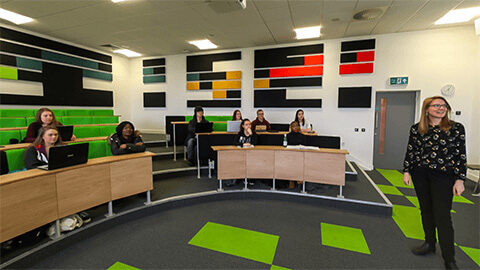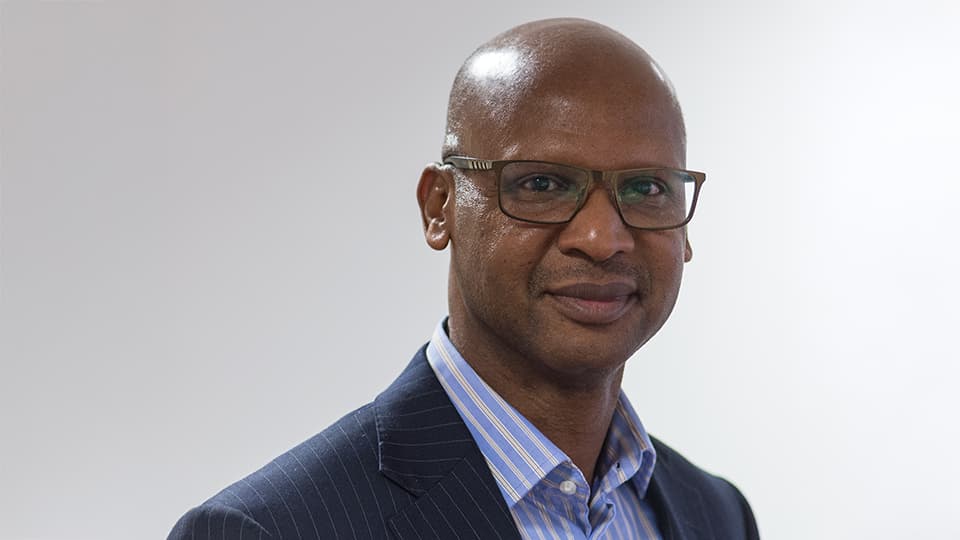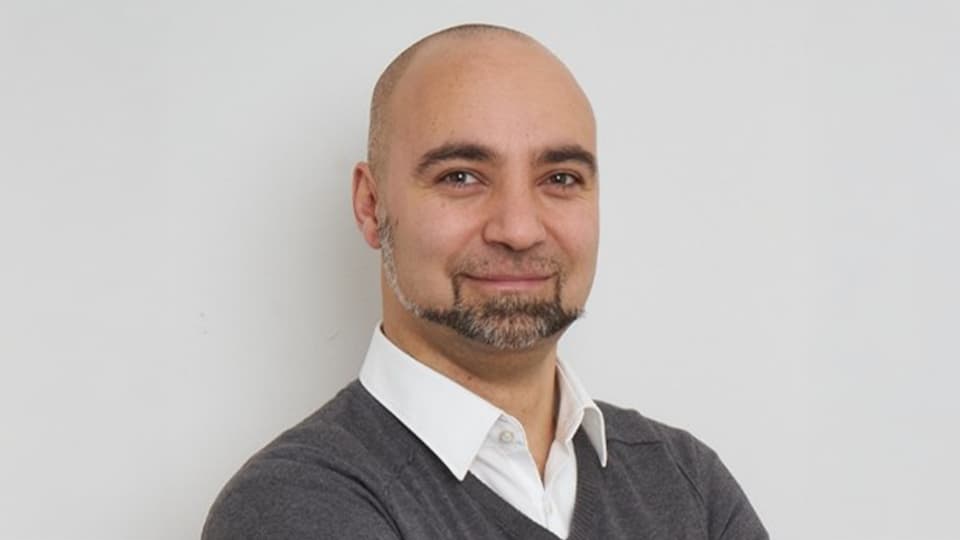Social Science Research
Qualification(s) available: MSc
- Fees for the 2026-27 academic year
-
UK: £11,500International: £25,000
- Entry requirements
- 2:1
- Full-time
- 1 year
- Part-time
- 2 years
- Location
- Loughborough
- Start date
- September 2026
Accredited by the Economic and Social Research Council (ESRC), our prestigious MSc Social Science Research programme is designed for students interested in a research career in academia or industry.
There are 10 pathways:
- Communication and Media
- Sociology, Criminology and Social Policy
- Health and Wellbeing
- Sport and Exercise Science
- Human Geography
- Education
- Management and Business Studies
- Living in a Digital Society
- Cross-disciplinary Methodologies and Advanced Data Analysis
- Sustainable Development, Net Zero and Climate Resilience
This programme has a strong focus on research. All pathways share three core modules covering qualitative and quantitative research, research design, practice and ethics in the context of social science research, taught by the School of Social Sciences and Humanities. Graduates from this programme will be fully equipped to independently undertake research, whether they intend to progress onto a PhD or a career in research.
The School of Social Sciences and Humanities is a stimulating environment in which to pursue a postgraduate degree. It fosters interdisciplinary research and collaboration and hosts the Centre for Research in Communication and Culture (CRCC), the Centre for Research in Social Policy (CRSP) and the Centre for Sustainable Transitions: Energy, Environment and Resilience (STEER)
The 10 available pathways allow students to tailor their degree towards their area of interest, complementing the core modules with pathway-specific modules taught by experts in the field, benefitting from a cross-disciplinary approach with teaching across departments:
Students on the Communication and Media, Living in a Digital Society or Cross-disciplinary Methodologies and Advanced Data Analysis pathways will take pathway-specific modules with the Communication and Media department. Communication and media research is conducted in the Centre for Research in Communication and Culture (CRCC) which was established in 1991. The centre is one of the largest of its kind in the UK and its core themes include: language and social interaction; media, memory, and history; and political communication.
Students on the Sociology, Criminology and Social Policy pathway, will take pathway-specific modules with the Criminology Sociology and Social Policy department - host to the prestigious Centre for Research in Social Policy (CRSP), which over the past 30 to 40 years has developed an international reputation for high quality applied policy research. Most prominently, CRSP is currently involved in the study of the Minimum Income Standard programme.
Students on the Human Geography or Sustainable Development, Net Zero and Climate Resilience pathways, will take pathway-specific modules with the Geography and Environment department, home to the Centre for Sustainable Transitions: Energy, Environment and Resilience (STEER) the UK's largest dedicated centre for sustainable energy research, pioneering global energy and economic modelling strategies to deliver the clean energy transition and develop the international standards our graduates will use in their future careers.
Students on the Sport and Exercise and on the Health and Wellbeing pathways will take pathway-specific modules with the School of Sport, Exercise and Health Sciences. Research within the School of Sport, Exercise and Health Sciences is multidisciplinary, drawing on the full spectrum of natural and social sciences, and is focused on issues of contemporary concern at international, national and local levels. Recent research projects have explored: human rights in sport; levels of BAME representation in football leadership and coaching; safeguarding in, around and through sport, promoting physical activity in workplaces; eating for optimal health and wellbeing; athlete mental health; and Sport For A Better World? - a social scientific investigation of the Sport for Development and Peace (SDP) sector.
Students on the Management and Business Studies pathway will take pathway-specific modules with Loughborough Business School. Taught by experienced and internationally recognised researchers and educators, the pathway-specific modules offer contemporary perspectives on managing and using data and sustainability and net zero, with a strong emphasis on using theory and data to tackle the research problems of today and the future.
Students on the Education Pathway will complete pathway specific modules taught by internationally recognised researchers with the Department of Mathematics Education in the School of Science. The Department of Mathematics Education is home to the Centre for Mathematical Cognition as well as the ESRC-funded Centre for Early Mathematical Learning; the UK’s largest dedicated centres to pioneer research on mathematical cognition and learning and to harness insights from this research to improve educational practice of teaching and learning mathematics.
The programme is in full compliance with the Economic and Social Research Council’s requirements for an MSc in Social Science Research. On completion of the course, students will have met the training requirements for PhD funding from the ESRC, opening up the possibility of securing PhD funding from the ESRC. This programme is also available as part of an ESRC Studentship. Loughborough University is proud to be part of Midlands Graduate School ESRC DTP, which offers studentships for outstanding applicants. ESRC funding is highly competitive and subject to restrictions.
Who should study this programme?
- Students wishing to pursue a career in academia
- Professionals who wish to both develop and strengthen their applied research skills in any of the 10 available areas of study
- Those wishing to conduct research in non-academic public and private sector roles.
Why you should choose us
Why you should study this degree
- We offer a stimulating environment for research and collaboration.
- There is an opportunity for PhD funding from ESRC.
- Our School is home to several world-renowned research centres including the Centre for Research in Communication and Culture, the Centre for Research in Social Policy, and the Centre for Sustainable Transitions: Energy, Environment and Resilience.
What you'll study
The following information is intended as an example only and is typically based on module information for the 2025/26 year of entry. Modules are reviewed on an annual basis and may be subject to future changes. Updated Programme and Module Specifications are made available ahead of each academic year. Please also see Terms and Conditions of Study for more information.
Our Social Science Research MSc programmes are designed to produce graduates with rigorous research and analytical skills, who are well equipped to progress onto being high level researchers in their chosen field of study. All pathway modules are compulsory. For more information about part-time study patterns, please contact the School/Department.
Compulsory module - all pathways
Research Design and Research Practice (30 credits)
This module introduces students to what methodology is, connecting to the ontological and epistemological debates with considerations for realistic research design in the social sciences and related fields. The module emphasises the interconnectedness between concepts and theory with data collection and analysis. Students are introduced to the different ontological and epistemological ways in which social science research is framed. Their role in research design will be considered, especially with a view to the different sources of knowledge that are available and appropriate. Students will then examine research methodologies across onto-epistemological approaches. On the basis of this, students will be able to submit a research outline at the end of the module. In the context of thinking about methodology, students will also address ethical questions about the relationship and power dynamics between the researcher and research subjects as well as those engaged in knowledge production outside of academia.
Communication and Media pathway
Understanding Contemporary Media (15 credits)
The rise of digital platforms, datafication and Artificial Intelligence are rapidly transforming the societies we live in. How can we best approach and understand these changing landscapes, and can old theoretical frameworks still help us make sense of the media world we live in today? This module is designed to introduce students to some of the key concepts and advanced debates relevant to the study of contemporary communications and media. Providing students with relevant theoretical background as well as practical examples from contemporary media environments, the module revisits some of the classic theoretical debates in the field and brings them into dialogue with recent technological, social, cultural and political developments.
Media Industries and Professions (15 credits)
The aim of this module is to outline the major conceptual and empirical questions raised by work on the media and cultural industries, media and cultural policy; to examine the changes that have taken place in the media and cultural industries under the impact of cultural, social, political and technological change since the 1970s and to explore the questions these changes raise for public policy. A series of practical case studies in the media and cultural industries will allow students to gain a good understanding of professional work in these sectors.
Sociology, Criminology and Social Policy pathway
International Politics: Issues and Policies (15 credits)
This module aims to provide students with knowledge of a range of issues drawn from contemporary international politics that are discussed in multilateral fora. It develops a problem-solving approach and impresses upon students the policy relevance of the discipline of International Politics. This module encourages students to explore a central characteristic of international life through introductory lectures into selected contemporary issues and practice relevant workshops. This is done through the development of conceptual knowledge, and the application of skills of analysis.
Contemporary Issues in Criminology and Criminological Theory (15 credits)
This module introduces criminology and criminological theory through a range of issues, case study examples and topical debates. It introduces students to the key theoretical approaches within criminology that act as a framework for understanding areas such as victimisation, mental health, criminal justice, youth justice psychology and the law and violence.
The module encourages students to analyse critically a range of criminology and social issues and problems in contemporary Britain, and the arrangements that have been devised to meet them.
Management and Business Studies
Building Data Driven Strategy (15 credits)
The aims of this module are to:
- Understand the theoretical concepts of strategy and strategic management in relation to organisations using data and data analysis to build and implement their strategies
- Explore and evaluate methods used by organisations to determine strategic options
- Develop an understanding of the uses of data and data analysis as drivers for strategic change
- Develop skills in business environmental analysis and strategic planning
- Develop an understanding of the importance of risk management and corporate social responsibility when formulating a new data driven strategy
Discovery Analytics (15 credits)
The aims of this module are:
To provide students with an in-depth understanding of the principles of data analysis in the context of analytics and management science problems.
To enable students to develop numerical reasoning, analytical skills and competency to apply a range of statistical models to datasets and interpret their results.
To provide students with practical experience of analysing real world datasets using leading analytics software tools.
To provide a firm basis for the Customer Analytics module in semester 2.
Sport and Exercise Science pathway
The Development of Sport (15 credits)
The aim of this module is to enhance student understanding of the main aspects of the development of sport in local, national and global contexts.
Psychology of Exercise for Clinical Populations (15 credits)
The aim of this module is to provide students with a critical understanding of the psychological and cultural principles that inform effective exercise promotion in clinical populations within community and healthcare settings.
Health and Wellbeing
Self-Regulation in Sport and Exercise (15 credits)
The aim of this module is for the student to:
- critically examine theory, research and practice in understanding self-regulation and associated developmental and interpersonal processes in sport and physical activity.
Psychology of Exercise for Clinical Populations (15 credits)
The aim of this module is to provide students with a critical understanding of the psychological and cultural principles that inform effective exercise promotion in clinical populations within community and healthcare settings.
Human Geography pathway
Financial Globalization (15 credits)
The central aim of this module is for students to develop an advanced understanding of the central role of International Financial Centres (IFCs), and the clusters of financial services and advanced producers services contained therein, to the development of a globalised financial system.
Climate Futures (15 credits)
The aim of this module is to develop an understanding of alternative climate pathways, to use data and tools to define probable climate futures (with a focus on the UK over the 21st century), and to rehearse strategies for communicating future change.
Living in a Digital Society pathway
Understanding Contemporary Media (15 credits)
The rise of digital platforms, datafication and Artificial Intelligence are rapidly transforming the societies we live in. How can we best approach and understand these changing landscapes, and can old theoretical frameworks still help us make sense of the media world we live in today? This module is designed to introduce students to some of the key concepts and advanced debates relevant to the study of contemporary communications and media. Providing students with relevant theoretical background as well as practical examples from contemporary media environments, the module revisits some of the classic theoretical debates in the field and brings them into dialogue with recent technological, social, cultural and political developments.
Digital Economies (15 credits)
This module examines the impacts of digital technologies on media and cultural industries and how they matter to society. Also, it offers students an introduction to the economic sociology of digital media.
Cross-disciplinary Methodologies and Advanced Data Analysis pathway
Researching Communications 1: Media Users and Cultural Industries (15 credits)
The aim of this module is to develop knowledge and understanding of a range of methodologies for the analysis of media users and institutions. The module focuses on critically discuss how qualitative and quantitative methodologies are applied, identifying their strengths and shortcomings.
Studying Talk and Social Interaction (15 credits)
Talk and social interaction shapes and mediates all our personal, professional and institutional relationships, but is often neglected as a focus of empirical analysis. This course provides a practical introduction to analysing spoken, embodied, and mediated social interaction in a range of institutional settings using Conversation Analysis (CA). Students will learn to analyse institutional talk such as emergency dispatch, media interviews, classrooms, and counselling sessions in relation to the broadest category of 'everyday talk'. The overall aim is to enable students to analyse and improve communication in applied and institutional settings.
Sustainable Development, Net Zero and Climate Resilience pathway
Climate Futures (15 credits)
The aim of this module is to develop an understanding of alternative climate pathways, to use data and tools to define probable climate futures (with a focus on the UK over the 21st century), and to rehearse strategies for communicating future change.
Mapping and Modelling the Sustainable Development Goals (SDGs) (15 credits)
The aim of this module is to understand how the UN Sustainable Development Goals (SDGs) relate to each other and model how they interact; with a special focus on the quantitative analysis of Climate, Land, Energy and Water systems (CLEWs).
Education pathway
Research Traditions in Education (30 credits)
The aims of this module are:
- to introduce various different research programmes, or theoretical traditions, that have been adopted to study education over the past 60 years, using mathematics education as a case study;
- to consider the strengths and weaknesses of different approaches to studying education, and to understand associated historical debates.
Compulsory modules - all pathways
Advanced Quantitative Research Methods in Social Science (15 credits)
The aims of this module are to reinforce students' skills in designing and interpreting statistical tests and using statistical software and to introduce the methods and theory for the design and analysis of social science and humanities research.
Dissertation in Social Science Research (60 credits)
The aim of this module is for students to design, conduct, analyse and report an original empirical study within their chosen field/pathway.
Communication and Media pathway
Media Representations, Identity and Digital Culture (15 credits)
The main aim of this module is to define and critically examine key concepts and theories that help understand how media and communication are involved in shaping our sense of identity, belonging and community. It will have a particular focus on the changes brought by digital media in constructing hierarchies of belonging and the forms of inclusion and exclusion that are linked to these.
Through lectures, classroom discussions and practical tasks students will focus on a range of cultural and social identities including gender, class, ethnicity and sexuality and examine the impacts that different communication technologies (press, cinema, radio, television, social media) have had on the representation and evaluation of groups across time. Through this, students will be able to appreciate both the changes prompted by digital communication as well as the persistence of old forms of representation, discrimination and exclusion.
Researching Communications 2: Texts and Digital Platforms (15 credits)
The module is designed to introduce students to research methods that are applied for the analysis of media and communication content and output, both on traditional as well as on new, digital platforms. Apart from providing the students with critical overview and discussion of strengths and weaknesses of these methods, both quantitative and qualitative, the module enables them to explore their practical application in adjacent workshops.
Sociology, Criminology and Social Policy pathway
Media Representations, Identity and Digital Culture (15 credits)
The main aim of this module is to define and critically examine key concepts and theories that help understand how media and communication are involved in shaping our sense of identity, belonging and community. It will have a particular focus on the changes brought by digital media in constructing hierarchies of belonging and the forms of inclusion and exclusion that are linked to these.
Through lectures, classroom discussions and practical tasks students will focus on a range of cultural and social identities including gender, class, ethnicity and sexuality and examine the impacts that different communication technologies (press, cinema, radio, television, social media) have had on the representation and evaluation of groups across time. Through this, students will be able to appreciate both the changes prompted by digital communication as well as the persistence of old forms of representation, discrimination and exclusion.
Sports Criminology (15 credits)
This module aims to examine crime, deviance and social change through a sporting lens. It will engage with the key theoretical approaches within the social sciences that can act as a framework for understanding more practical examples of crime, deviance and social change in sport.
Management and Business Studies
Managing Big Data (15 credits)
The aims of this module are:
to develop a critical appreciation of the theory and practice of managing big data and its significance for business in the global environment
to develop an awareness of the skills required for managing big data in different sectors
to understand how big data can be used to address real world issues
to understand how business opportunities can be identified and exploited using big data and big data analytics
to explore the range of software tools available for managing large data sets.
The Economics of Sustainability and Net Zero (15 credits)
The aims of this module are to develop the skills which allow the student to:
- understand relevant economic concepts and tools and their relevance to environmental sustainability and net zero
- identify and assess how complex economic, regulatory, engineering, institutional and environmental factors influence the potential feasibility and likely success of government policies, commercial strategies, and technologies aimed at improving sustainability and achieving net zero.
- develop report writing and presentation capabilities in preparation for future employment, with a focus on making underlying complex analysis understandable to the target audience.
Sport and Exercise Science pathway
Social Processes in Sport (15 credits)
The aims of this module are:
- to provide students with theoretical underpinnings of social processes in sport
- to provide students with practical knowledge and skills in relation to evaluation of social processes in sport, including coach-athlete relationships, group dynamics, team cohesion, leadership, organisational culture, and safeguarding.
Sports Criminology (15 credits)
This module aims to examine crime, deviance and social change through a sporting lens. It will engage with the key theoretical approaches within the social sciences that can act as a framework for understanding more practical examples of crime, deviance and social change in sport.
Health and Wellbeing
Mental Health in Sport and Exercise (15 credits)
The aims of this module are to examine and translate evidence relating to mental health and exercise in athlete and other populations.
Social Processes in Sport (15 credits)
The aims of this module are:
- To provide students with theoretical underpinnings of social processes in sport
- to provide students with practical knowledge and skills in relation to evaluation of social processes in sport, including coach-athlete relationships, group dynamics, team cohesion, leadership, organisational culture, and safeguarding
Human Geography pathway
The Global Financial System under Climate Change (15 credits)
The central aims of this module are to: (1) develop a diversity of perspectives to examine the contemporary financial system; and (2) critically consider the relations between the global financial system and climate change.
Climate Science into Practice (15 credits)
Climate services is a growth industry involving the translation of climate science into usable formats that support high-consequence decision-making, operating rules, and design of long-lived assets, despite deep uncertainty about the future. The aim of this module is to understand diverse sources of climate risk information and, through practical exercises, learn to implement appraisal frameworks used to operationalise climate science, within complex institutional, ethical and governance landscapes.
Living in a Digital Society pathway
Data, Power and Democracy (15 credits)
This module addresses the ways in which social media platforms such as Facebook, Twitter, Instagram, WhatsApp, and Snapchat are changing the ways in which political actors, citizens, and journalists interact with each other, advance their goals, and exercise power. We will engage with contemporary arguments and debates about the democratic implications of social media by drawing on state-of-the-art theory and cutting-edge research, as well as case studies of relevant contemporary events and controversies.
The module will enable students to understand how social media are used by citizens, political actors, and journalists to access, distribute, and coproduce content that is relevant to public affairs and provide opportunities for political learning, persuasion, mobilization, and engagement. It will use both theory and empirical research to shed light on how social media are enhancing and hindering practices and structures of citizenship and democratic politics.
Researching Communications 2: Texts and Digital Platforms (15 credits)
The module is designed to introduce students to research methods that are applied for the analysis of media and communication content and output, both on traditional as well as on new, digital platforms. Apart from providing the students with critical overview and discussion of strengths and weaknesses of these methods, both quantitative and qualitative, the module enables them to explore their practical application in adjacent workshops.
Cross-disciplinary Methodologies and Advanced Data Analysis pathway
Researching Communications 2: Texts and Digital Platforms (15 credits)
The module is designed to introduce students to research methods that are applied for the analysis of media and communication content and output, both on traditional as well as on new, digital platforms. Apart from providing the students with critical overview and discussion of strengths and weaknesses of these methods, both quantitative and qualitative, the module enables them to explore their practical application in adjacent workshops.
Economic Modelling and Policy for Sustainable Development (15 credits)
The aim of this module is to understand policy options and their economic impacts on Sustainable Development, with a focus on greenhouse gas (GHG) mitigation and adaptation policy in the energy sector.
Sustainable Development, Net Zero and Climate Resilience pathway
Climate Science into Practice (15 credits)
Climate services is a growth industry involving the translation of climate science into usable formats that support high-consequence decision-making, operating rules, and design of long-lived assets, despite deep uncertainty about the future. The aim of this module is to understand diverse sources of climate risk information and, through practical exercises, learn to implement appraisal frameworks used to operationalise climate science, within complex institutional, ethical and governance landscapes.
Economic Modelling and Policy for Sustainable Development (15 credits)
The aim of this module is to understand policy options and their economic impacts on Sustainable Development, with a focus on greenhouse gas (GHG) mitigation and adaptation in the energy sector.
Education pathway
Strategic Interaction (15 credits)
The aim of this module is to introduce students to domains of strategic communication in the real world in which professional parties, such as crisis negotiators, politicians, and healthcare practitioners, must provide information, make decisions, persuade, and influence others in real time for a range of purposes. The module will explore social interactional research approaches to investigating and understanding what constitutes effective practice, and how communication shapes engagement and behaviour through case studies and recorded live interactions. Students will learn the theory and methods of conversation analysis and how to apply it to diverse settings with the overall aim of understanding and improving the effectiveness of communication in these situations.
Researching Communications 2: Texts and Digital Platforms (15 credits)
The module is designed to introduce students to research methods that are applied for the analysis of media and communication content and output, both on traditional as well as on new, digital platforms. Apart from providing the students with critical overview and discussion of strengths and weaknesses of these methods, both quantitative and qualitative, the module enables them to explore their practical application in adjacent workshops.
Optional modules all pathways (select one)
Qualitative Research (15 credits)
The aims of this module are for the student to:
- to gain a comprehensive and critical understanding of qualitative research design principles as applied to sport and exercise research;
- to gain a critical understanding and appreciation of the philosophical, ethical and stakeholder issues which underpin qualitative research, and how this affects qualitative research design;
- to critically review and communicate how different qualitative research designs inform understanding in sport and exercise research generally and in their particular field of study;
- to gain a critical understanding of how to apply rigor checks in qualitative research;
- to examine and analyse phenomena appropriately in accordance with research design.
Advances in Ethnography (15 credits)
The aim of this module is to consider both traditional and advanced approaches to ethnographic research. By exploring recent debates and innovations in ethnography alongside practical sessions on adapting ethnography for contemporary challenges and applied settings, the module will equip students with a detailed knowledge of the methodological concerns underpinning ethnographic fieldwork allowing them to integrate ethnographic principles into their own qualitative research projects.
Semesters 2 & 3 Compulsory modules - all pathways
Dissertation in Social Science Research (60 credits)
The aim of this module is for students to design, conduct, analyse and report an original empirical study within their chosen field/pathway.
How you'll be assessed
You will be assessed through a variety of coursework, including essays and reports. The final assessment is a poster presentation and a dissertation, based on an original research project carried out with one-to-one guidance from a supervisor.
How you'll study
- Lectures
- Seminars
- Tutorials
- Independent study
- Group work
- Workshops
- Practical sessions
Entry requirements
Our entry requirements are listed using standard UK undergraduate degree classifications i.e. first-class honours, upper second-class honours and lower second-class honours. To learn the equivalent for your country, please choose it from the drop-down below.
Entry requirements for United Kingdom
A 2:1 honours degree (or equivalent international qualification) in Social Sciences and Humanities, and from other subject areas related to the pathways.
Afghanistan
| First-class honours (70%) | Upper second-class honours (60%) | Lower second-class honours (50%) | |
|---|---|---|---|
| Masters | 95% | 85% | 70% |
Albania
| First-class honours (70%) | Upper second-class honours (60%) | Lower second-class honours (50%) | |
|---|---|---|---|
| Diplomë e Nivelit të Pare (First Level (University) Diploma (from 2010) | 9.5 | 8.5 | 8 |
Algeria
| First-class honours (70%) | Upper second-class honours (60%) | Lower second-class honours (50%) | |
|---|---|---|---|
| Licence (4 year) / Diplome d'Inginieur d'Etat / Diplôme d'Etudes Supérieures | 16 | 14 | 12 |
Argentina
| First-class honours (70%) | Upper second-class honours (60%) | Lower second-class honours (50%) | |
|---|---|---|---|
| Licenciatura/ Licenciado (4 year) | 8.5 | 7.5 | 6.0 |
Armenia
| First-class honours (70%) | Upper second-class honours (60%) | Lower second-class honours (50%) | |
|---|---|---|---|
| Bakalavri Kochum required but typically a Magistrosi Kochum | 90% or 3.9 | 80% or 3.5 | 70% or 3.0 |
Australia
| First-class honours (70%) | Upper second-class honours (60%) | Lower second-class honours (50%) | |
|---|---|---|---|
| Honours degree (AQF level 8) | First Class, 80% | Upper Second, 70%, H2A | Lower Second, 60%, H2B |
| Ordinary degree - AQF Level 7 pass (mark 46 or 50) | High Distinction (80% or 85%) | Distinction (75% or 80%) | Distinction (70% or 75%) |
Austria
| First-class honours (70%) | Upper second-class honours (60%) | Lower second-class honours (50%) | |
|---|---|---|---|
| Degree / Diplomstudium / Fachhochschuldiplom (Diplom (FH)) | A (or 1.5) mit Auszeichnungbestanden | 60% / B / (or 2) | 60% / B / (or 2) |
Azerbaijan
| First-class honours (70%) | Upper second-class honours (60%) | Lower second-class honours (50%) | |
|---|---|---|---|
| Bakalavr Diplomu/ Diplomu (Specialist Diploma) | 4.5 or 90% | 4 or 80% | 3.5 or 70% |
Bahamas
| First-class honours (70%) | Upper second-class honours (60%) | Lower second-class honours (50%) | |
|---|---|---|---|
| Degree from University of the West Indies only | 1st (GPA 3.6) | 2:1 (GPA 3.0) | 2:2 (GPA 2.5) |
Bahrain
| First-class honours (70%) | Upper second-class honours (60%) | Lower second-class honours (50%) | |
|---|---|---|---|
| GPA 4.0 scale | 3.5 | 3.0 | 2.5 |
Bangladesh
| First-class honours (70%) | Upper second-class honours (60%) | Lower second-class honours (50%) | |
|---|---|---|---|
| 4 Year Bachelor of Science in Engineering (IEB and BAETE accredited courses up to 2024) Any 4 year Bachelor degree or BSc in Nursing (2025 onwards) |
1st (70%) / 3.5 | 2nd (60%) / 3.0 | 2nd (55%) / 2.75 |
| Masters (1-2 years) following a 3 or 4 year degree | 80% / 4.0 | 65% / 3.25 | 50% / 2.5 |
Belarus
| First-class honours (70%) | Upper second-class honours (60%) | Lower second-class honours (50%) | |
|---|---|---|---|
| Specialist Diploma (5Yr) | 9 | 7 | 5 |
Belgium
| First-class honours (70%) | Upper second-class honours (60%) | Lower second-class honours (50%) | |
|---|---|---|---|
| Bachelor degree/Licenciaat/Licencie | 80% or 17 | 70% or 14 | 60% or 12 |
Belize
| First-class honours (70%) | Upper second-class honours (60%) | Lower second-class honours (50%) | |
|---|---|---|---|
| Degree from University of the West Indies only | 1st (GPA 3.6) | 2:1 (GPA 3.0) | 2:2 (GPA 2.5) |
Benin
| First-class honours (70%) | Upper second-class honours (60%) | Lower second-class honours (50%) | |
|---|---|---|---|
| Maitrise | 18 | 15 or Bien | 12 or Assez Bien |
Bermuda
| First-class honours (70%) | Upper second-class honours (60%) | Lower second-class honours (50%) | |
|---|---|---|---|
| Degree from University of the West Indies only | 1st (GPA 3.6) | 2:1 (GPA 3.0) | 2:2 (GPA 2.5) |
Bolivia
| First-class honours (70%) | Upper second-class honours (60%) | Lower second-class honours (50%) | |
|---|---|---|---|
| A Licenciado, 4 years Private (public/private) | 85/78 | 75/66 | 67/55 |
Bosnia and Herzegovina
| First-class honours (70%) | Upper second-class honours (60%) | Lower second-class honours (50%) | |
|---|---|---|---|
| Diploma Visokog Obrazovanja / Diplomirani | 10 | 9 | 8 |
Botswana
| First-class honours (70%) | Upper second-class honours (60%) | Lower second-class honours (50%) | |
|---|---|---|---|
| Master's degree | A or 80% | B or 70% | C or 60% |
Brazil
| First-class honours (70%) | Upper second-class honours (60%) | Lower second-class honours (50%) | |
|---|---|---|---|
| Brazil - 4 yr Bacharel or Licenciado/Licenciatura or Título Profissional | 8.5 | 7.5 | 6.5 |
Brunei
| First-class honours (70%) | Upper second-class honours (60%) | Lower second-class honours (50%) | |
|---|---|---|---|
| Brunei | First | Upper Second (60%/B/3.1) | Lower Second (50% or C or 2.5) |
Bulgaria
| First-class honours (70%) | Upper second-class honours (60%) | Lower second-class honours (50%) | |
|---|---|---|---|
| 5 yr Diploma za Zavarsheno Visshe Obrazovanie (Diploma of Completed Higher Education) | 6 | 5 | 4 |
Burundi
| First-class honours (70%) | Upper second-class honours (60%) | Lower second-class honours (50%) | |
|---|---|---|---|
| Masters or Diplôme d'Études Approfondies or Diplôme Ingénieur (professional title) | 18 | 15/20 (Bien) | 12.5/20 (Assez Bien) |
Cambodia
| First-class honours (70%) | Upper second-class honours (60%) | Lower second-class honours (50%) | |
|---|---|---|---|
| Masters | 80% or B+ or 3.5 | 70% or B or 3.0 | 60% or C+ or 2.5 |
Cameroon
| First-class honours (70%) | Upper second-class honours (60%) | Lower second-class honours (50%) | |
|---|---|---|---|
| Bachelor degree or Diplome d'Etudes Superiures de Commerce or Diplome d'Ingenieur or Diplôme d'Ingénieur de Conception or a Maitrise, 4 year Licence or Master 1 (M1) | 1st / 3.6 or 15/Tres Bien | 2:1 / GPA 3.0 or 14 / Bien | 2:2 / GPA 2.5 or 12.5/ Assez Bien |
Canada
| First-class honours (70%) | Upper second-class honours (60%) | Lower second-class honours (50%) | |
|---|---|---|---|
| GPA 4.0/Percentage | 3.7/85% | 3.3/75% | 2.7/68% |
| Out of 9 | 8 | 6 | 5 |
| Out of 12 | 10 | 8 | 6 |
Chile
| First-class honours (70%) | Upper second-class honours (60%) | Lower second-class honours (50%) | |
|---|---|---|---|
| Grado de Licenciado / Título (Profesional) de [subject area] (4 years) | 6 | 5.5 | 5 |
China
Students are required to have a bachelor degree (4 years) for entry to a postgraduate programme. The University uses a tiered ranking system to identify the required final mark, as outlined on the table below.
You can search for your institution (university or affiliated college) via our look up tool.
| First class (70%) | Mid 2:1 (65%) | 2:1 (60%) | Mid 2:2 (55%) | 2:2 (50%) | |
|---|---|---|---|---|---|
| Tier 1 | 80% | 76% | 72% | 70% | 67% |
| Tier 2 | 83% | 79% | 75% | 73% | 70% |
| Tier 3 | 86% | 82% | 79% | 77% | 75% |
Colombia
| First-class honours (70%) | Upper second-class honours (60%) | Lower second-class honours (50%) | |
|---|---|---|---|
| Licenciado / Título de [subject area] | 4.5 | 3.75 | 3.2 |
Costa Rica
| First-class honours (70%) | Upper second-class honours (60%) | Lower second-class honours (50%) | |
|---|---|---|---|
| Licenciado | 9 | 8 or 80 | 7 or 75 |
Croatia
| First-class honours (70%) | Upper second-class honours (60%) | Lower second-class honours (50%) | |
|---|---|---|---|
| Baccalaureus / Prvostupnik | 4.5 | 3.8 | 3.0 |
Cuba
| First-class honours (70%) | Upper second-class honours (60%) | Lower second-class honours (50%) | |
|---|---|---|---|
| 4-year Titulo de Licenciado / Licenciatura | 5 | 4 | 3 |
Cyprus
| First-class honours (70%) | Upper second-class honours (60%) | Lower second-class honours (50%) | |
|---|---|---|---|
| Cyprus | 8.5 | 7.0 | 6.5 |
Czech Republic
| First-class honours (70%) | Upper second-class honours (60%) | Lower second-class honours (50%) | |
|---|---|---|---|
| Bakalár (after 2001) 6 yr integrated Magistr | 1 | 1.5 | 2 |
Denmark
| First-class honours (70%) | Upper second-class honours (60%) | Lower second-class honours (50%) | |
|---|---|---|---|
| 5 year Candidatus/Candidata Magisterii or Bachelor degree (7 point scale) | 12 | 10 | 7 |
Dominican Republic
| First-class honours (70%) | Upper second-class honours (60%) | Lower second-class honours (50%) | |
|---|---|---|---|
| 4 year Licenciado or Título de [subject area] | 3.8 | Magna Cum Laude or 3.5 or 85% | Cum Laude or 3.2 or 82% |
Ecuador
| First-class honours (70%) | Upper second-class honours (60%) | Lower second-class honours (50%) | |
|---|---|---|---|
| Título de Licenciado / Título de [subject area] | 8.5 / 85% | 8 / 80% | 7 / 70% |
Egypt
| First-class honours (70%) | Upper second-class honours (60%) | Lower second-class honours (50%) | |
|---|---|---|---|
| Egypt | 3.5 | 3.2 | 2.8 |
| Universities only | BA 90%, BSc 85% | BA 80%, BSc 75% | BA 65%, BSc 65% |
El Salvador
| First-class honours (70%) | Upper second-class honours (60%) | Lower second-class honours (50%) | |
|---|---|---|---|
| 5 year Licenciado, Título de Ingeniero/Arquitecto | 8.5, 85% | 7.5, 75% or Muy Bueno | 6.5, 65% or Bueno |
Estonia
| First-class honours (70%) | Upper second-class honours (60%) | Lower second-class honours (50%) | |
|---|---|---|---|
| Bakalaureusekraad or Magister or Magistrikraad | 5 or 91% or A | 4 or 81% or B | 3 or 71% or C |
Ethiopia
| First-class honours (70%) | Upper second-class honours (60%) | Lower second-class honours (50%) | |
|---|---|---|---|
| Masters (up to 2025) | A / GPA 4.0 | A / GPA 3.5 | B / GPA 2.8 |
| 4-year Bachelor degree with thesis (from 2024) | A / GPA 4.0 | A / GPA 3.5 | B / GPA 2.8 |
| 5-year Bachelor degree (from 2025) | A / GPA 4.0 | A / GPA 3.5 | B / GPA 2.8 |
Finland
| First-class honours (70%) | Upper second-class honours (60%) | Lower second-class honours (50%) | |
|---|---|---|---|
| Kandidaattii/Kandidat or the Maisteri/Magister | 3 (out of 3) or 4.5 (out of 5) | 2 (out of 3) or 3 (out of 5) | 1 (out of 3) or 2.5 (out of 5) |
France
| First-class honours (70%) | Upper second-class honours (60%) | Lower second-class honours (50%) | |
|---|---|---|---|
| Licence (3 years)/ Maitrise/ Diplôme d'Ingénieur | 14 | 13 | 11 |
Georgia
| First-class honours (70%) | Upper second-class honours (60%) | Lower second-class honours (50%) | |
|---|---|---|---|
| 4-year degree (% = new system) | 5 (95%) | 4.0 (85%) | 3.5 (75%) |
Germany
| First-class honours (70%) | Upper second-class honours (60%) | Lower second-class honours (50%) | |
|---|---|---|---|
| German Bachelor/ Diplom, Magister Artium / Zeugnis über den Zweiten Abschnitt der Ärztlichen Prüfung | 1.5 | 2.5 | 3.0 |
Ghana
| First-class honours (70%) | Upper second-class honours (60%) | Lower second-class honours (50%) | |
|---|---|---|---|
| Ghana | 65% / 3.4 GPA | 57% / 3.0 GPA | 50% / 2.5 GPA |
Greece
| First-class honours (70%) | Upper second-class honours (60%) | Lower second-class honours (50%) | |
|---|---|---|---|
| Universities | 8.5 | 7.0 | 6 |
| TEI and non-University Institutions | 8.5 | 7 | 6.5 |
Grenada
| First-class honours (70%) | Upper second-class honours (60%) | Lower second-class honours (50%) | |
|---|---|---|---|
| Degree from University of West Indies - classification | 1st, 70% (GPA 3.6) | 2:1, 60% (GPA 3.00) | 2:2, 50% (GPA 2.5) |
| Degree from University of West Indies - grade / percentage | A | B / 75% | C / 55% |
| Degree from University of West Indies - GPA | 3.6 | 3.0 | 2.0 |
Guatemala
| First-class honours (70%) | Upper second-class honours (60%) | Lower second-class honours (50%) | |
|---|---|---|---|
| Liceniado / Titulo de (subject area) - 4 years | 90% (public university) / 95% (private university) | 80% (public university) / 85% (private university) | 60% (public university) / 70% (private university) |
Guyana
| First-class honours (70%) | Upper second-class honours (60%) | Lower second-class honours (50%) | |
|---|---|---|---|
| Master's | GPA 4 | GPA 3.5 | 3.0 |
Honduras
| First-class honours (70%) | Upper second-class honours (60%) | Lower second-class honours (50%) | |
|---|---|---|---|
| Título de Licenciado / Grado Académico de Licenciatura (4 year degree) - GPA out of 5 | GPA 5 or 90% | GPA 4 or 80% | GPA 3.5 or 70% |
Hong Kong
| First-class honours (70%) | Upper second-class honours (60%) | Lower second-class honours (50%) | |
|---|---|---|---|
| Bachelor degree (Honours) | 1st or 3.5/4 | 2:1 or 3/4 | 2:2 or 2.5/4 |
Hungary
| First-class honours (70%) | Upper second-class honours (60%) | Lower second-class honours (50%) | |
|---|---|---|---|
| Alapfokozt or Egyetemi Oklevel / Bachelor | 4.5 | 3.5 | 3 |
Iceland
| First-class honours (70%) | Upper second-class honours (60%) | Lower second-class honours (50%) | |
|---|---|---|---|
| Baccalaurreatus degree or Kandidatsprof/Candidatus Mag | 8.5 | 7.5 | 6.5 |
India
| First-class honours (70%) | Upper second-class honours (60%) | Lower second-class honours (50%) | |
|---|---|---|---|
| Institutions listed on the National Institutional Ranking Framework | 61% | 55% | 50% |
| All other Indian institutions | 68% | 62% | 57% |
Indonesia
| First-class honours (70%) | Upper second-class honours (60%) | Lower second-class honours (50%) | |
|---|---|---|---|
| Sarjana I (S1) from accredited Universities | 3.2 | 3.0 | 2.8 |
Iran
| First-class honours (70%) | Upper second-class honours (60%) | Lower second-class honours (50%) | |
|---|---|---|---|
| Iran | 17 | 15 | 13 |
Iraq
| First-class honours (70%) | Upper second-class honours (60%) | Lower second-class honours (50%) | |
|---|---|---|---|
| Iraq | 80% | 75% | 70% |
Ireland
| First-class honours (70%) | Upper second-class honours (60%) | Lower second-class honours (50%) | |
|---|---|---|---|
| Republic of Ireland | First (70%) | Upper second (60%) | Lower second (50%) |
Israel
| First-class honours (70%) | Upper second-class honours (60%) | Lower second-class honours (50%) | |
|---|---|---|---|
| 3 yr Bachelor Degree | 90% | 80% | 70% |
Italy
| First-class honours (70%) | Upper second-class honours (60%) | Lower second-class honours (50%) | |
|---|---|---|---|
| Diploma di Laurea | 109/110 | 100/110 | 90/110 |
Ivory Coast
| First-class honours (70%) | Upper second-class honours (60%) | Lower second-class honours (50%) | |
|---|---|---|---|
| Diplome d'Etude Approfondies, Diplome d'Etude Superieures or Diplome d'Etude Superieures | 16 | 14 (Bien) | 12 (Assez Bien) |
Jamaica
| First-class honours (70%) | Upper second-class honours (60%) | Lower second-class honours (50%) | |
|---|---|---|---|
| For degrees studied at The University of West Indies or degrees accredited by UCJ and CCCJ | 1st (GPA 3.6) | 2:1 (GPA 3.0) or B | 2:2, 50% (GPA 2.5) |
Japan
| First-class honours (70%) | Upper second-class honours (60%) | Lower second-class honours (50%) | |
|---|---|---|---|
| Gakushi – GPA 4.0 scale | 85% or A or 3.5 | 80% or B or 3.0 | 70% or C or 2.0 |
Jordan
| First-class honours (70%) | Upper second-class honours (60%) | Lower second-class honours (50%) | |
|---|---|---|---|
| GPA 4.0 scale | 3.5 | 3 or 3.5/5 or 75% | 2.5 (or 3.0/5) / 63% |
Kazakhstan
| First-class honours (70%) | Upper second-class honours (60%) | Lower second-class honours (50%) | |
|---|---|---|---|
| GPA 5.0/percentage scale | 4.5 or 90% | 4 or 85% | 3.5 or 80% |
| GPA 4.33 scale | 3.9 | 3.7 | 3.2 |
| GPA 4.0 scale | 3.7 | 3.4 | 3 |
Kenya
| First-class honours (70%) | Upper second-class honours (60%) | Lower second-class honours (50%) | |
|---|---|---|---|
| Kenya | First / 70% / A | Upper second / 60% / B | Lower second / 50% / C |
Kosovo
| First-class honours (70%) | Upper second-class honours (60%) | Lower second-class honours (50%) | |
|---|---|---|---|
| Kosovo | 10 | 9 | 8 |
Kuwait
| First-class honours (70%) | Upper second-class honours (60%) | Lower second-class honours (50%) | |
|---|---|---|---|
| GPA 4.0 scale | 3.6 | 3.0 | 2.6 |
Latvia
| First-class honours (70%) | Upper second-class honours (60%) | Lower second-class honours (50%) | |
|---|---|---|---|
| Latvia | 9 | 7 | 6 |
Lebanon
| First-class honours (70%) | Upper second-class honours (60%) | Lower second-class honours (50%) | |
|---|---|---|---|
| American | 85% (3.5) | 75% (3.0) | 62% (2.6) |
| French | 18 | 15 | 12 |
Liberia
| First-class honours (70%) | Upper second-class honours (60%) | Lower second-class honours (50%) | |
|---|---|---|---|
| Master's | 4.0 or 90% | 3.5 or 85% | 3 or 80% |
Libya
| First-class honours (70%) | Upper second-class honours (60%) | Lower second-class honours (50%) | |
|---|---|---|---|
| BSc Engineering, Architecture, Medicine | 85 (3.6) | 75 (3.0) | 65 (2.5) |
| Other bachelor's degree from a university | 90 (4.0) | 85% (3.6) | 75% (3.0) |
Lithuania
| First-class honours (70%) | Upper second-class honours (60%) | Lower second-class honours (50%) | |
|---|---|---|---|
| Lithuania | 9 | 8 | 7 |
Luxembourg
| First-class honours (70%) | Upper second-class honours (60%) | Lower second-class honours (50%) | |
|---|---|---|---|
| Luxembourg | 18 (excellent) | 16 (tres Bien) | 14 (bien) |
Macau
| First-class honours (70%) | Upper second-class honours (60%) | Lower second-class honours (50%) | |
|---|---|---|---|
| Macau | 1st or GPA 3.7 | 2:1 or GPA 3.0 | 2:2 or GPA 2.5 |
Macedonia
| First-class honours (70%) | Upper second-class honours (60%) | Lower second-class honours (50%) | |
|---|---|---|---|
| Magistar Дипломиран / Баццалауреус / Баццалауреа (Bachelor degree) | 10 | 9 | 8 |
Malawi
| First-class honours (70%) | Upper second-class honours (60%) | Lower second-class honours (50%) | |
|---|---|---|---|
| Master's only | MSc 75% | MSc 70% | MSc 65% |
Malaysia
| First-class honours (70%) | Upper second-class honours (60%) | Lower second-class honours (50%) | |
|---|---|---|---|
| Classification | First Class | 2.1 | GPA 2.5 |
| GPA 4.0 scale | 3.5 | 3.0 | 2.8 |
Malta
| First-class honours (70%) | Upper second-class honours (60%) | Lower second-class honours (50%) | |
|---|---|---|---|
| Malta | 1st (80%) | 2:1 (70%) | 2:2 (55%) |
Mauritius
| First-class honours (70%) | Upper second-class honours (60%) | Lower second-class honours (50%) | |
|---|---|---|---|
| Mauritius | 1st or 70% | 2:1 or 60% | 2:2 or 50% |
Mexico
| First-class honours (70%) | Upper second-class honours (60%) | Lower second-class honours (50%) | |
|---|---|---|---|
| Licenciatura / Licenciado/ Título (Profesional) de [subject area] | 8.5 | 8 | 7 |
Moldova
| First-class honours (70%) | Upper second-class honours (60%) | Lower second-class honours (50%) | |
|---|---|---|---|
| Diploma de Licenţă (Diploma of Licentiate) | 9 | 8 | 7 |
Mongolia
| First-class honours (70%) | Upper second-class honours (60%) | Lower second-class honours (50%) | |
|---|---|---|---|
| Диплом Специалиста (Specialist Diploma) | 90% or 3.5 | 80% or GPA 3.2 | 70% or GPA 3.0 |
Montenegro
| First-class honours (70%) | Upper second-class honours (60%) | Lower second-class honours (50%) | |
|---|---|---|---|
| Diploma of Completed Undergraduate Studies or Diploma of Professional Undergraduate Studies | 10 (or 5.0) | 9 (or 4.5) | 8 (or 4.0) |
Morocco
| First-class honours (70%) | Upper second-class honours (60%) | Lower second-class honours (50%) | |
|---|---|---|---|
| Diplôme d'Ingénieur d'État, Diplôme d'Écoles Nationales de Commerce et de Gestion, Licence / Licence d'Études Fondamentales / Licence Professionnelle | 16 | 14 | 12 |
Mozambique
| First-class honours (70%) | Upper second-class honours (60%) | Lower second-class honours (50%) | |
|---|---|---|---|
| Mestrado/ Grau de Mastre | 16 | 14 | 12 |
Myanmar (Burma)
| First-class honours (70%) | Upper second-class honours (60%) | Lower second-class honours (50%) | |
|---|---|---|---|
| 2 year Master's degree | 5 or 85% | 5 or 75% | 4.5 or 65% |
Namibia
| First-class honours (70%) | Upper second-class honours (60%) | Lower second-class honours (50%) | |
|---|---|---|---|
| 4-year Bachelor Honours (post 2008) or Masters | 80% or A | 70% or B | 60% or C |
Nepal
| First-class honours (70%) | Upper second-class honours (60%) | Lower second-class honours (50%) | |
|---|---|---|---|
| 4 -year professional degree or Masters (after 3-year Bachelor degree) | 80% or 3.7 GPA | 65% or 3.3 GPA | 60% or 3.0 GPA |
Netherlands
| First-class honours (70%) | Upper second-class honours (60%) | Lower second-class honours (50%) | |
|---|---|---|---|
| Netherlands | 8 | 7 | 6 |
New Zealand
| First-class honours (70%) | Upper second-class honours (60%) | Lower second-class honours (50%) | |
|---|---|---|---|
| 4 Year Honours degree (480 credits) - Level 8 | First (7.0) | Upper Second (6.0) | Lower Second (4.0) |
| 3 Year degree (360 credits) - Level 7 | A+ (9.0) | A- (7.0) | B+ (6.0) |
Nicaragua
| First-class honours (70%) | Upper second-class honours (60%) | Lower second-class honours (50%) | |
|---|---|---|---|
| Licenciatura (4 year) | 90% | 80% | 70% |
Nigeria
| First-class honours (70%) | Upper second-class honours (60%) | Lower second-class honours (50%) | |
|---|---|---|---|
| 7 point Scale | 6 | 5 | 3.0 (on 5 point scale) |
| 5 point scale | 4 | 3.4 | 2.7 |
| 4 point scale | 3.5 | 3 | 2.5 |
Norway
| First-class honours (70%) | Upper second-class honours (60%) | Lower second-class honours (50%) | |
|---|---|---|---|
| Norway | A / 1.8 | B / 2.3 | C / 3.0 |
Oman
| First-class honours (70%) | Upper second-class honours (60%) | Lower second-class honours (50%) | |
|---|---|---|---|
| GPA 4.0 scale | 3.5 | 3.0 | 2.5 |
Pakistan
| First-class honours (70%) | Upper second-class honours (60%) | Lower second-class honours (50%) | |
|---|---|---|---|
| 4 Year degree only (the higher of the 2 options) | A- or GPA 3.7 | B or GPA 3.0 | C+ or GPA 2.6 |
| 2 or 3 year Bachelor plus Masters | 1st (60%) plus GPA 3.7 | 2nd (55%) plus GPA 3.0 | 2nd (50%) plus GPA 2.6 |
Palestine
| First-class honours (70%) | Upper second-class honours (60%) | Lower second-class honours (50%) | |
|---|---|---|---|
| Bachelor (4-years) | (85%) 3.5 | (80%) 3.0 | (70%) 2.5 |
Panama
| First-class honours (70%) | Upper second-class honours (60%) | Lower second-class honours (50%) | |
|---|---|---|---|
| 4 Year Licenciado / Título de [subject area] | 91 (A) | 81 (B) | 71 (C) |
Papua New Guinea
| First-class honours (70%) | Upper second-class honours (60%) | Lower second-class honours (50%) | |
|---|---|---|---|
| Bachelor (Honours) Degree | 1st | 2:1 | 2:2 |
Paraguay
| First-class honours (70%) | Upper second-class honours (60%) | Lower second-class honours (50%) | |
|---|---|---|---|
| 4 Year Título de Licenciado / Título de [subject area] | 4.5 (85%) | 4 (80%) | 3.5 (75%) |
Peru
| First-class honours (70%) | Upper second-class honours (60%) | Lower second-class honours (50%) | |
|---|---|---|---|
| 4 Year Título de Licenciado / Título de [subject area] | 14 | 13 | 12 |
Philippines
| First-class honours (70%) | Upper second-class honours (60%) | Lower second-class honours (50%) | |
|---|---|---|---|
| Degree from prestigious state universities or Centres of Excellence (COE) | Summa Cum Laude 4.0 / 96% / 1.0 | Magna cum Laude 3.5 / 92% / 1.5 | Cum Laude 3.0 / 87%/ 2.0 |
Poland
| First-class honours (70%) | Upper second-class honours (60%) | Lower second-class honours (50%) | |
|---|---|---|---|
| Bachelor Degree (post 2003) Magister (pre- 2003) | 5 | 4.5 | 4 |
Portugal
| First-class honours (70%) | Upper second-class honours (60%) | Lower second-class honours (50%) | |
|---|---|---|---|
| Diploma de Estudos Superiores Especializados (DESE) or Licenciado | 18 | 16 | 14 |
Qatar
| First-class honours (70%) | Upper second-class honours (60%) | Lower second-class honours (50%) | |
|---|---|---|---|
| GPA 4.0 scale | 3.5 | 3.0 | 2.8 |
Romania
| First-class honours (70%) | Upper second-class honours (60%) | Lower second-class honours (50%) | |
|---|---|---|---|
| Diploma de Licenta/ Diploma de Inginer | 9 | 8 | 7 |
Russia
| First-class honours (70%) | Upper second-class honours (60%) | Lower second-class honours (50%) | |
|---|---|---|---|
| Bakalavr/Specialist Diploma/Magistr | 4.5 | 4.0 | 3.5 |
Rwanda
| First-class honours (70%) | Upper second-class honours (60%) | Lower second-class honours (50%) | |
|---|---|---|---|
| 4 year bachelor (Hons) degree (480 credits) | 1st, 16/20 (80%) | 2:1,14/20 (70%) | 2:2, 12/20 (60%) |
Saudi Arabia
| First-class honours (70%) | Upper second-class honours (60%) | Lower second-class honours (50%) | |
|---|---|---|---|
| GPA 4.0 scale | 3.5 | 3.0 | 2.8 |
| GPA 5.0 scale | 4.5 | 3.75 | 3.5 |
Senegal
| First-class honours (70%) | Upper second-class honours (60%) | Lower second-class honours (50%) | |
|---|---|---|---|
| Maitrise, Diplome d'Etude Approfondies, Diplome d'Etude Superieures or Diplome d'Etude Superieures Specialisees | 16/20 or Tres Bien | 14/20 or Bien | 12/20 or Assez Bien |
Serbia
| First-class honours (70%) | Upper second-class honours (60%) | Lower second-class honours (50%) | |
|---|---|---|---|
| Diplomirani/ Bachelor's degree | 9 | 8 | 7 |
Sierra Leone
| First-class honours (70%) | Upper second-class honours (60%) | Lower second-class honours (50%) | |
|---|---|---|---|
| Honours degree or masters | 1st (70%) | 2:1 (60% or B) | 2:2 (50% or C) |
Singapore
| First-class honours (70%) | Upper second-class honours (60%) | Lower second-class honours (50%) | |
|---|---|---|---|
| Bachelor (Hons) | First | Upper second | Lower second |
| GPA 4.0 scale | 3.7 | 3.0 | 2.7 |
| GPA 5.0 scale | 4.5 | 3.5 | 3.0 |
Slovakia
| First-class honours (70%) | Upper second-class honours (60%) | Lower second-class honours (50%) | |
|---|---|---|---|
| Bakalár (from 2005) Magister / Inzinier | 1.5 or B | 2.0 or C | 2.5 or C/high D |
Slovenia
| First-class honours (70%) | Upper second-class honours (60%) | Lower second-class honours (50%) | |
|---|---|---|---|
| University Diplom | 9 | 8 | 7 |
South Africa
| First-class honours (70%) | Upper second-class honours (60%) | Lower second-class honours (50%) | |
|---|---|---|---|
| Bachelor (Honours) or B Tech after 4 yrs study | 1st or 75% | 2:1 or 70% | 2:2 or 60% |
South Korea
| First-class honours (70%) | Upper second-class honours (60%) | Lower second-class honours (50%) | |
|---|---|---|---|
| GPA out of 4.5 | 3.8 / B+ | 3.2 / B | 2.8 / C+ |
| GPA out of 4.3 | 3.8 / B+ | 2.9 / C+ | 2.7 / C+ |
Spain
| First-class honours (70%) | Upper second-class honours (60%) | Lower second-class honours (50%) | |
|---|---|---|---|
| Licenciado / Título de Ingeniero / Título de Arquitecto | 8.5 | 7 | 6.5 |
| UCM grading | 3.0 | 2.0 | 1.5 |
Sri Lanka
| First-class honours (70%) | Upper second-class honours (60%) | Lower second-class honours (50%) | |
|---|---|---|---|
| 4 year Professional degree or Bachelor Special or Honours degree | 90%, GPA 3.70 | 80%, GPA 3.30 | 70%, GPA 3.0 |
Sudan
| First-class honours (70%) | Upper second-class honours (60%) | Lower second-class honours (50%) | |
|---|---|---|---|
| 4 year degree | 1st, 70%, B+ | 2:1, 66% | mid 2:2, 60%, B |
Sweden
| First-class honours (70%) | Upper second-class honours (60%) | Lower second-class honours (50%) | |
|---|---|---|---|
| Kandidatexamen or Magisterexamen | Overall grade of VG with a minimum of 120 credits at VG | B or Overall grade of VG with a minimum of 90 credits at VG | C or Overall grade of G with a minimum of 90 credits at G |
Switzerland
| First-class honours (70%) | Upper second-class honours (60%) | Lower second-class honours (50%) | |
|---|---|---|---|
| Bachelor Degree, Diplom or Lizentiat (10/6/5) | 10 / 5.5 / 1 | 8 / 5 / 2 | 6 / 4 / 3 |
Syria
| First-class honours (70%) | Upper second-class honours (60%) | Lower second-class honours (50%) | |
|---|---|---|---|
| State universities 4 years of study | 80% | 70% | 60% |
| Private universities 4 years of study | 90% | 80% | 70% |
Taiwan
| First-class honours (70%) | Upper second-class honours (60%) | Lower second-class honours (50%) | |
|---|---|---|---|
| 4 year degree | 76% 3.0 GPA |
70% 2.8 GPA |
65% 2.6 GPA |
Tajikistan
| First-class honours (70%) | Upper second-class honours (60%) | Lower second-class honours (50%) | |
|---|---|---|---|
| Диплом специалиста - Specialist Diploma | 5 | 4.5 | 4 |
Tanzania
| First-class honours (70%) | Upper second-class honours (60%) | Lower second-class honours (50%) | |
|---|---|---|---|
| Tanzania | 1st | 2:1 | 2:2 |
Thailand
| First-class honours (70%) | Upper second-class honours (60%) | Lower second-class honours (50%) | |
|---|---|---|---|
| GPA 4.0 scale | 3.2 | 2.8 | 2.6 |
Trinidad and Tobago
| First-class honours (70%) | Upper second-class honours (60%) | Lower second-class honours (50%) | |
|---|---|---|---|
| For degrees studied at The University of West Indies or degrees accredited by ACTT | 1st or GPA 3.6 | 2:1 or GPA 3.0 | 2:2 or GPA 2.5 |
Tunisia
| First-class honours (70%) | Upper second-class honours (60%) | Lower second-class honours (50%) | |
|---|---|---|---|
| Licence, Maîtrise, Diplôme National d'Ingénieu | 16 (tres bien) | 14 (bien) | 11 (assez bien) |
Turkey
| First-class honours (70%) | Upper second-class honours (60%) | Lower second-class honours (50%) | |
|---|---|---|---|
| Lisans Diplomasi or a Műhendis Diplomasi | 3.3 | 2.9 | 2.4 |
Turkmenistan
| First-class honours (70%) | Upper second-class honours (60%) | Lower second-class honours (50%) | |
|---|---|---|---|
| 4 Yr Bakalavr, Specialist Diploma or Magistr | 5 | 4.5 | 4 |
Uganda
| First-class honours (70%) | Upper second-class honours (60%) | Lower second-class honours (50%) | |
|---|---|---|---|
| Uganda | 1st or 4.4 | 2:1 or 3.8 | 2:2 or 3.0 |
Ukraine
| First-class honours (70%) | Upper second-class honours (60%) | Lower second-class honours (50%) | |
|---|---|---|---|
| Dyplom Magistra or a Bachelors degree (11 / 5) | 4.5 | 4.0 | 3.5 |
United Arab Emirates
| First-class honours (70%) | Upper second-class honours (60%) | Lower second-class honours (50%) | |
|---|---|---|---|
| GPA 4.0 scale | 3.5 | 3.0 | 2.6 |
United States of America
| First-class honours (70%) | Upper second-class honours (60%) | Lower second-class honours (50%) | |
|---|---|---|---|
| GPA 4.0 scale | 3.5 | 3 | 2.6 |
Uruguay
| First-class honours (70%) | Upper second-class honours (60%) | Lower second-class honours (50%) | |
|---|---|---|---|
| Licenciado (4 year) | 9 | 8 | 7 |
Uzbekistan
| First-class honours (70%) | Upper second-class honours (60%) | Lower second-class honours (50%) | |
|---|---|---|---|
| Majistr Diplomi / Diplomi (Specialist Diploma) | 90% or GPA 4.5 | 80% or GPA 4.0 | 70% or GPA 3.5 |
Venezuela
| First-class honours (70%) | Upper second-class honours (60%) | Lower second-class honours (50%) | |
|---|---|---|---|
| Licenciado/Professional title. (4 year) | 18/20 or 8/9 | 16/20 or 7/9 | 14/20 or 6/9 |
Vietnam
| First-class honours (70%) | Upper second-class honours (60%) | Lower second-class honours (50%) | |
|---|---|---|---|
| 10-point scale | 8.0 | 7.0 | 6.0 |
| 4-point scale | 3.2 | 2.8 | 2.4 |
Zambia
| First-class honours (70%) | Upper second-class honours (60%) | Lower second-class honours (50%) | |
|---|---|---|---|
| Master's | A or 4.0 or 80% | B+, 3.5 or 70% | B or 3.0 or 60% |
Zimbabwe
| First-class honours (70%) | Upper second-class honours (60%) | Lower second-class honours (50%) | |
|---|---|---|---|
| 3/4 year degree | 1st or 75% | 2:1 or 65% | 2:2 or 60% |
English language requirements
Applicants must meet the minimum English language requirements. Further details are available on the International website.
Fees and funding
Fees for the 2026-27 academic year
UK fee
£11,500 Full-time degree per annum
International fee
£25,000 Full-time degree per annum
The fee stated is for a full-time student undertaking a master’s programme of 180 credits. Part-time students will spread this credit load over a two or more years of study as agreed with the School/Department. Fees will be charged for the credit weighting of modules taken in a given year. The tuition fees payable can be calculated by dividing the published fee by 180 and then multiplying by the number of credits to be taken in the specific year.
Fees are reviewed annually and are likely to increase in subsequent years by a small amount (will not exceed 5%) to take into account inflationary pressures.
Your development
The School of Social Sciences and Humanities is committed to helping you develop the skills and attributes you need to progress successfully in your chosen career.
On successful completion of this programme you will be able to:
- Use the social science research skills you have gained from a school that is internationally renowned in this field.
- Communicate effectively to specialist and non-specialist audiences.
- Plan, organise and manage, with appropriate supervision, a significant self-directed research project.
- Work flexibly, creatively and independently, displaying a high degree of self-direction and initiative.
Our academics
Your future career
The programme is in full compliance with the Economic and Social Research Council’s requirements for an MSc in Social Science Research. On completion of the course, you will have met the training requirements for PhD funding from the ESRC, opening up the possibility of securing future doctoral funding from this research council.
Graduates from this course have progressed on to a range of roles including:
- PhD Researcher
- Research Executive
- Media Executive
- Web and Communications Advisor
- Government Social Researcher
Recent graduate destinations include:
- Loughborough University
- The University of Nottingham
- The Ministry of Justice
- Ipsos UK
- MMR Research













